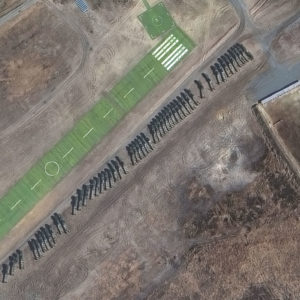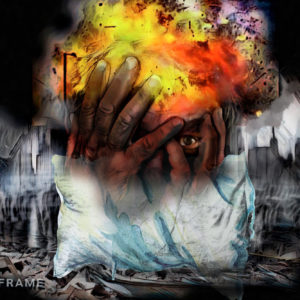A footballer’s narrow escape from Ukraine
A Cameroonian who played in Ukraine’s lower leagues details the ordeal and racism he experienced as he fled the country during Russia’s invasion.
Author:
10 March 2022

“This is where I have always dreamt to be,” says Serge Hamadou*, “play football in central Europe.” Russia’s invasion of Ukraine, however, turned that dream into a nightmare.
The Cameroonian footballer found himself in a position where his life was threatened. In trying to survive, he was not met with the warmth and goodwill Ukranians have received from Europe and the rest of the world.
“Despite my condition I will not give up. I see myself at the top and I must achieve that,” says Hamadou, who left Cameroon in 2020 to play in the amateur ranks in Dnipro, a city in central Ukraine. Hamadou did not immediately seek to leave the country when Russia started its invasion on 24 February.
When the explosions started in Kyiv, where his friends were, and closer to the city’s airport, Hamadou’s friends journeyed to Poland and other safe countries. The first group, he says, were lucky as not many people had opted to leave Ukraine at that time.
Related article:
When danger came closer Hamadou and two compatriots decided to flee. The footballer, in his early 20s, tried to escape by bus.
“The place was crowded with many people, many Africans, including my football colleagues from Cameroon. Automatically, the transportation fare increased because those drivers saw it as an opportunity to make money. Four of us paid $200 for a distance of 71km. The drivers covered just 15km and abandoned us. We trekked 56km.”
Hamadou says they trekked in frosty conditions carrying their goods. When they finally got to the border, they couldn’t enter Poland. “Security put Africans on one side and allowed just whites to cross. We were stranded at the border for one day. Some people for two days, some three days. The condition was unchanged. We had to return to the train station.”
Racism, fleeing or living
Things got worse back at the train station. There was a train bound for Poland while others transported people to a city close to Slovakia and Hungary. Most people preferred going directly to Poland to avoid the stopovers on the way to Hungary.
“The process was terrible. I feel like I should cry while explaining because I went through difficulties.” He added that “only white women and their children were allowed to travel. They pushed us and even threatened us with guns. They threw insults at us. We had to fight to get space inside the train, to make it through to safety”.
When he made it inside the train, things were not any better. “We the Blacks were not allowed to sit. We travelled from Lviv [a city near the Polish border] for 24 hours standing in very tight space while women sat down with their kids, dogs and cats. They preferred giving seats to dogs rather than a Black guy.”
The racism Hamadou endured while fleeing Ukraine was nothing new to him. He had grown used to it in his time in the country. “They abuse you for fouling them during training sessions. They make you feel like you don’t know how to play football, and the coach says nothing,” he said.
Related article:
On Tuesday 1 March, the Cameroonian embassy in Germany said it had created a strategic monitoring unit “to follow up the situation of our compatriots in Ukraine”.
“Those who have crossed the borders and found themselves in Poland, Austria, Moldova, Hungary, Romania, Bulgaria, Belarus, Slovakia and Kosovo, and who have a Ukrainian residence permit, should contact the German embassies in the capitals of these countries for any consular assistance,” ambassador Ndocki Victor added.
For those still trapped there and willing to leave, the embassy provided contacts through which they can call and be helped to move into the European Union.
Related article:
Nicknamed “Little Magician”, Hamadou thought his talent would give him a better life. He played for several teams in Cameroon before receiving his big break to sign for a Ukrainian club that was managed by a fellow African. While in Poland, he hopes to “make some contacts. I am also waiting to hear from my manager. He has had plans for me and I believe this is the time to do something because I am at the centre of football, the heart of football in Europe. I am hoping for the best”.
Asked if he will return to Ukraine should there be a cease fire, Hamadou laughs before answering with an emphatic “no”.
“I will never. I never liked Ukraine, but as a footballer you are obliged to move and when you move, you experience a lot of things. Ukraine has just taught me a bitter experience and I don’t want to ever experience that.”
*not his real name



